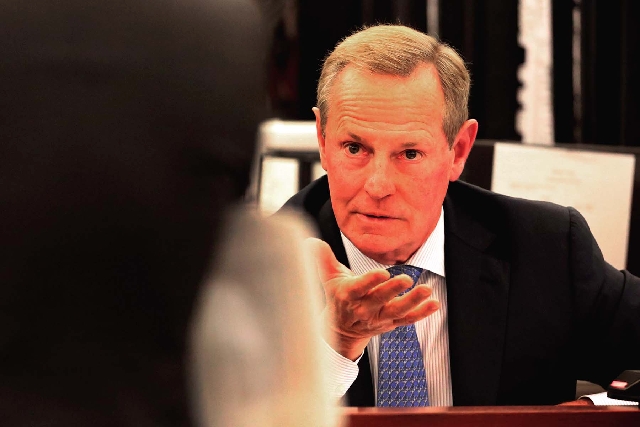Ex-Sands executive moves on after clash

Bill Weidner has put his 14 years as president of Las Vegas Sands Corp. in the rear view mirror.
Last month, Global Gaming Asset Management, which Weidner operates with former Las Vegas Sands executives Brad Stone and Garry Saunders, opened the first phase of Solaire, a planned $1.2 billion hotel-casino at Manila Bay in the Philippines.
The firm owns 10 percent of it and is managing the 500-room resort, the first of four anchor hotel-casinos in Manila’s Entertainment City.
Weidner has also been at the forefront of gaming expansion in Taiwan. His company is part of a group hoping to build a $2 billion hotel-casino there. Weidner also owns part of a trading company that exports commodities to China.
Global Gaming works with investment giant Cantor Fitzgerald and Weidner envisions establishing Weidner Resorts, with locations in China, India and Taiwan.
Weidner is due in New York City later this week on business.
“What’s 51 percent of 365 days a year?” Weidner, 68, asked. “That’s how much time I spend traveling.”
Philippine billionaires who are the majority backers in the Solaire project believe that market could emulate Macau, attracting big-spending gamblers from China, Japan and South Korea.
Creating the next Macau is Weidner’s focus.
So it was painfully obvious that Weidner wasn’t thrilled about devoting several days last week toward the retrial of Hong Kong businessman Richard Suen’s 9-year-old breach of contract lawsuit against Las Vegas Sands over the company’s licensing efforts in Macau.
The last place Weidner wanted to be was in the witness box of a Regional Justice Center courtroom, rehashing old testimony.
Before court convened, I asked him if the retrial was an annoyance. Weidner smiled and nodded his head.
A few minutes later, Weidner was sworn in as a witness. He gave the new jury nearly identical testimony to what he said almost five years to the day in the first trial, which resulted in Suen winning $43.8 million.
The Nevada Supreme Court overturned the verdict in 2010.
Weidner told the jury Suen didn’t earn the $328 million he is seeking from Las Vegas Sands. But Weidner also repeated previous testimony that Suen provided the company “valuable services” in the Macau licensing matter and that Las Vegas Sands had a “moral obligation” to pay him something for his efforts.
What is different this time around are Weidner’s feelings toward his former boss, Las Vegas Sands Chairman Sheldon Adelson.
He had a few choice comments this time about Adelson, whom he joined forces with in 1995 when Las Vegas Sands owned a single casino, the since-demolished Sands Las Vegas.
When the two parted ways in March 2009, the relationship between Weidner and Adelson had deteriorated far beyond public comments. At the time, Weidner characterized internal bickering inside the company’s boardroom “as a junkyard-dog fight.”
It was much worse.
The first Suen trial s tarted their downfall.
Weidner told the jury last week the Suen matter never should have gone to trial, blaming Adelson for not settling outside of legal proceedings.
The 2008 courtroom airing of the company’s 2002 internal and external maneuvers — by which Las Vegas Sands gained a piece of the gaming concession Macau originally awarded to Galaxy Entertainment — angered Chinese and Macau officials.
It was speculated that the 2008 government restrictions placed on residents of Mainland China for entry into Macau were meant to punish Las Vegas Sands, which relied on mass market business at The Venetian Macau.
Weidner all but confirmed those rumors last week, saying the first Suen trial “was injurious to relationships with China.” He also told jurors he “lost confidence in (Adelson’s) decision making.”
During Weidner’s first 30 minutes as a witness, he described details of his departure that had never before been made public. He also outlined events surrounding the company’s near financial collapse in October 2008 that were not complimentary of Adelson.
Weidner also told jurors that he left an estimated $20 million to $60 million in stock options on the table when he left Las Vegas Sands because he wouldn’t sign a nondisparagement clause that Adelson tried to slip into his separation agreement.
Weidner wanted to resign but Adelson fired him, nullifying the agreement.
He told the jury life was too short to be angry forever, which is why he didn’t file a lawsuit to recover some of his severance.
Weidner was Adelson’s right hand in the development of Las Vegas Sands. His team — the same group behind Global Gaming Asset Management — built The Venetian and Palazzo on the Strip, the Sands Macau and The Venetian Macau, and participated in the initial development of the Marina Bay Sands in Singapore.
We won’t know until the case goes to the jury whether Weidner’s comments about Adelson, unhindered by employment obligations or nondisparagement clauses, carry any weight in the eventual verdict.
Weidner, however, will probably be traveling.
Howard Stutz’s Inside Gaming column appears Sundays. He can be reached at hstutz@reviewjournal.com
or 702-477-3871. Follow @howardstutz on Twitter.












